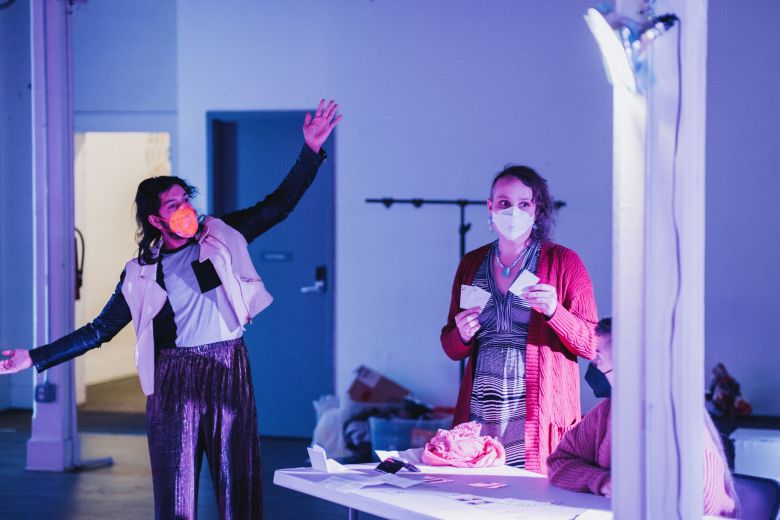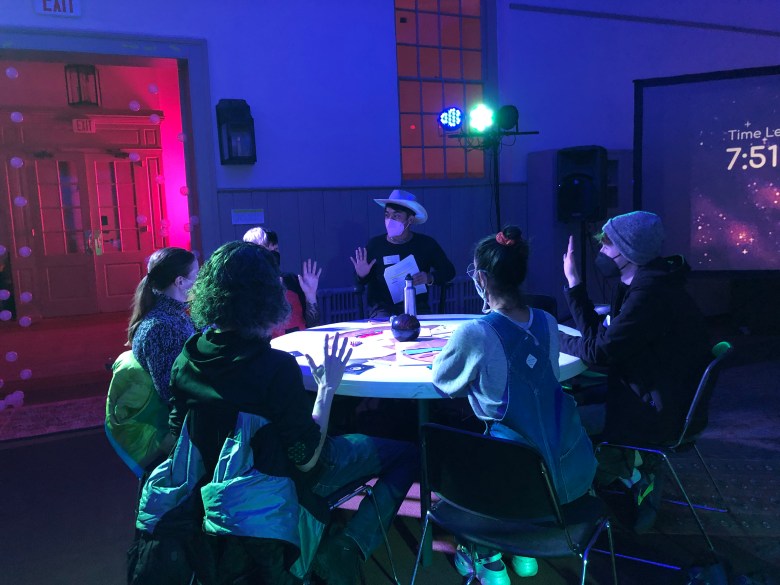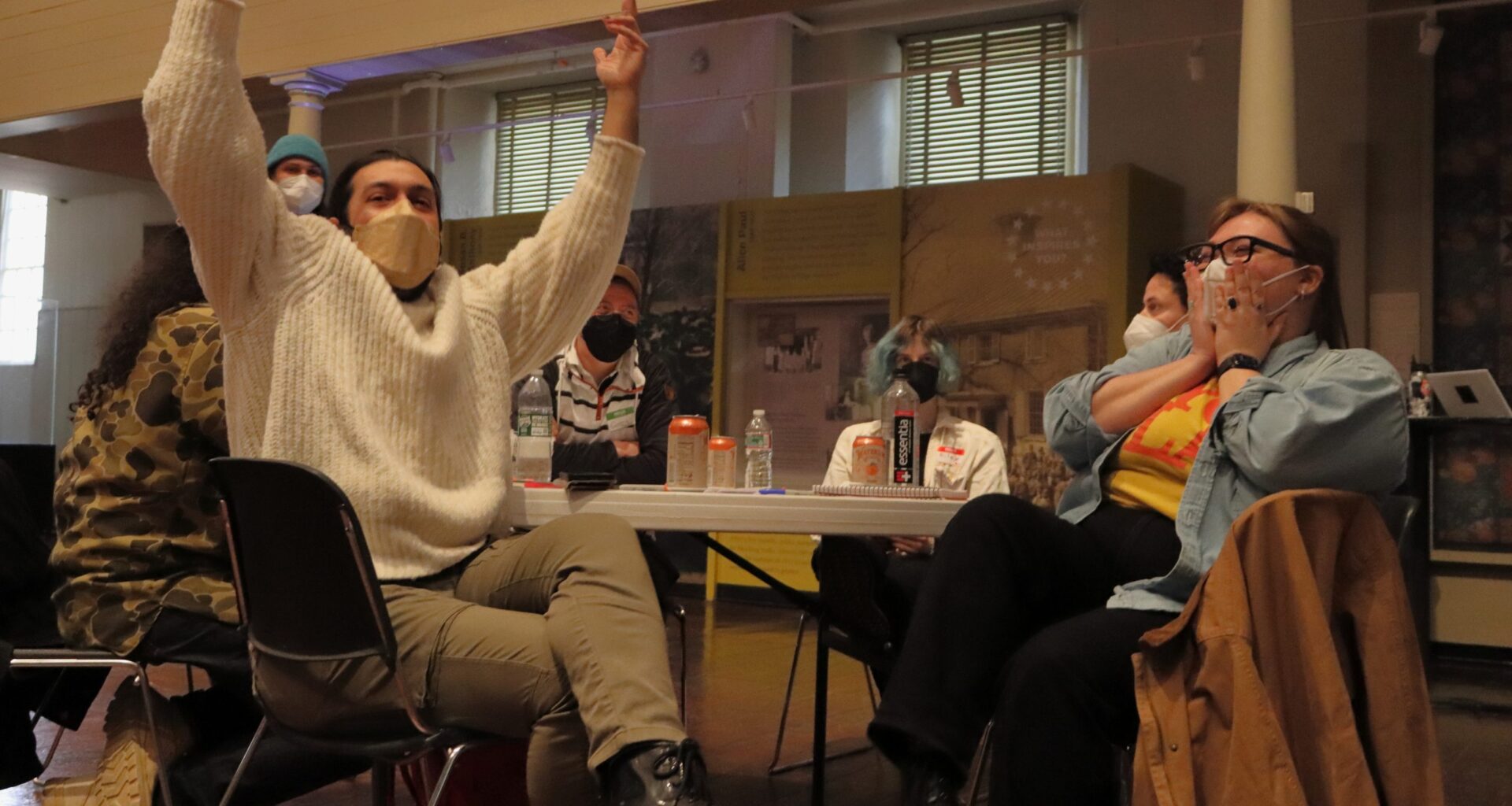Plenty of gamers would rather spend hours engrossed in the complexities of tabletop epics like Dungeons & Dragons than go to the theater.
Honestly, who needs theater when games provide a complex and exciting universe powered by imagination and a dice roll?
But wait. Philly theater company Obvious Agency covers it all with its epic 21-hour, three-Saturday, game-theater combo production, “Space Opera.” Audience members become gamers, forming planet societies and grappling with impending chaos and crises in a tabletop galaxy game, enhanced with all the accoutrements of theater – costumes, lighting, video, actor/facilitators and, of course, game masters. There’s even a funk band.
“Game-based theater is what we strive to do,” said Ari Gass, an assistant professor of digital media at Drexel University and one of Obvious Agency’s worker/owners. “We’re designing systems as a game designer would and supporting them with theatrical magic, which might include improvisational themes and lighting, along with the more traditional aspects of theatrical spectacle.”
 A player contemplates their action while a performer poses near them. In Space Opera participants play an active role in shaping the story and collaborate with game masters and performer/facilitators in a unique combination of gameplay and theatricality. (Photo Credit: Daoud Moon)
A player contemplates their action while a performer poses near them. In Space Opera participants play an active role in shaping the story and collaborate with game masters and performer/facilitators in a unique combination of gameplay and theatricality. (Photo Credit: Daoud Moon)
Now for a little reassurance: Yes, “Space Opera” takes place in three seven-hour (noon to 7 p.m.) Saturday sessions (June 14, 21 and 28). But each Saturday can also stand alone.
Also, you don’t have to play – you can watch, just as people gather as spectators for online gaming tournaments. And there’s food.
“We’ve set the scene for the galaxy and the universe, but we cannot tell you how day one is going to an end. We have a structure and rules we’ll follow to build a compelling experience,” Gass said.
“We like the idea that games are like systems – like an algebra equation. Every audience member is providing a unique x and getting a unique y,” said Daniel Park, another worker/owner and one of the “Space Opera” game designers. “Part of what happens is that people can experience the consequences of their actions, but in a safer and more playful space.”
 Daniel Park (Photo Credit: Plate 3 Photography)
Daniel Park (Photo Credit: Plate 3 Photography)
In “Space Opera,” audience members are divided into planetary groups. Together each group needs to make decisions to cope with a serious and impending crisis. Situations change with rolls of the dice. Participants develop relationships with each other and the performers to save the universe.
Besides its entertainment value, “Space Opera” has a broader purpose.
Park explained: “We live in a world that is designed to make normal, everyday working folks as passive as possible, to exhaust us, to distract us and to keep us fighting with one another. With all of our work, we want to help folks experience and feel a sense of empowerment that comes from them and through community.”
Gass added more context:
“In many ways, we really feel like in this moment, it’s even more [important]. We all need to know how to work together and what it takes to make decisions. If we don’t start practicing now, we’re going to have just one person making decisions. We’re seeing that now.
“How do we teach or build the skill of consensus?” Gass continued. “We know that skill is relevant to us in our lives right now. What if group organizing and consensus meetings could be a game?”
Obvious Agency built “Space Opera” on principles of what is known as “Theatre of the Oppressed,” a Brazilian movement intended to give the audience more power in the theatrical experience, making them “spect-actors,” not merely spectators.
 A group of players vote on an action their fictional society will take. The fate of the universe hangs in the balance. (Photo Credit: Marisol Rosa-Shapiro)
A group of players vote on an action their fictional society will take. The fate of the universe hangs in the balance. (Photo Credit: Marisol Rosa-Shapiro)
“Space Opera” fits broadly into the growing experiential theater trend, even though Obvious Agency criticizes typical ideas of immersive theater. Too often, Gass said, what passes for immersive theater is the audience following whatever patterns are created by others.
In “Space Opera,” the audience itself will determine what happens, just as players in a game do, hence the idea of “playable theater.”
“The traditional theater model is unsustainable and inaccessible,” Gass said. “People are excited for something that’s community building, rather than sitting silent in a crowd. Maybe that’s a product of the video-game generation.”
Coincidentally, NarraScope, an event that draws fans of narrative games, will take place at Drexel University during the “Space Opera” run. Attendees are writers, developers and players interested in interactive adventure games. The conference, set for June 20 through June 22, is sold out, but remote registration is available.
FYI
“Space Opera,” Obvious Agency, June 14, 21, 28, Arch Street Meeting House, 320 Arch St., Phila. Ticket prices vary depending on participation.
